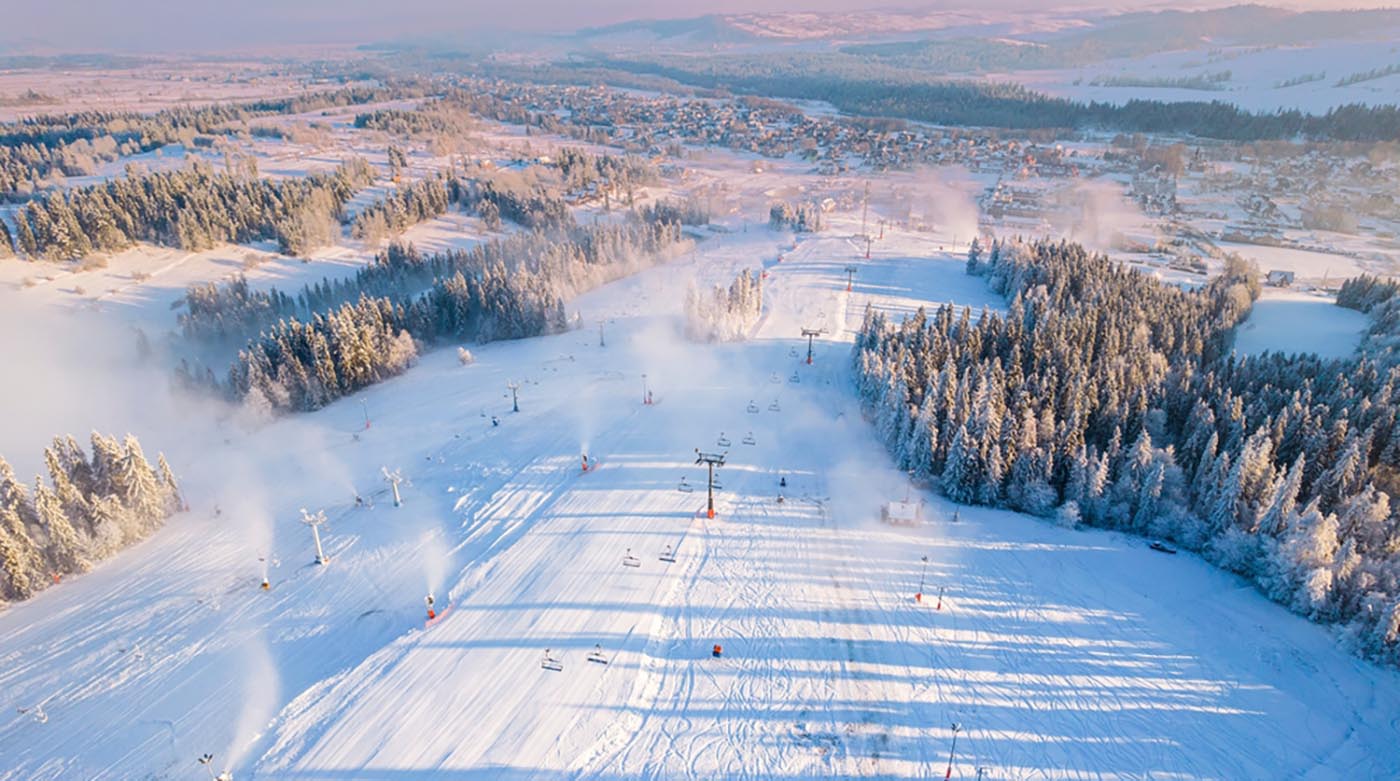Are you following the law every time you ride? States implement motorcycle helmet riding laws to protect riders and pedestrians — and each territory is different.
Let’s make something clear: Riding with a helmet is always a smart call, even just for a short trip to the grocery store. (Say it with us: All the gear, all the time!) According to the National Highway Traffic Safety Administration (NHTSA), helmets saved the lives of over 1,800 motorcyclists in 2017, and another 750 could’ve been saved had they worn helmets. We think every motorcyclist knows which of those lists they’d rather be on.
That said, there are still many riders who choose to go without a helmet, especially for short runs in town. For these riders, it’s important to know whether they can legally ride without a helmet or not. And even if you always wear a helmet, it’s useful to know what the law says in your state about whether you have to wear one — or whether it’s just a really, really good idea.
Types of Motorcycle Helmet Laws
U.S. states fall into one of three categories when it comes to motorcycle helmet laws:
-
States that require helmets for riders and passengers of all ages
-
States that require helmets for certain types of riders and passengers (such as people under 18), but make them optional for adult motorcyclists
-
States where helmets are optional for all riders and passengers
Most states fall into one of the first two categories. Nineteen states and Washington, D.C. have universal helmet laws, while 28 make helmets optional for certain riders. Just three states — Illinois, Iowa and New Hampshire — have no helmet laws for anyone.
Legal Consequences for Riding Without a Helmet
The consequence of riding without a helmet that should scare you the most is the possibility of an accident in which there’s nothing between your head and the pavement. That aside, you also might be in for some legal consequences for riding without a helmet.
If you’re pulled over for riding without a helmet in a state where it’s required, you may get off with a warning, but you also may get a ticket and a fine. It’s largely up to the discretion of the officer pulling you over. Your motorcycle license also might pick up some points, be suspended or be revoked. In rare cases or instances where other laws have been broken, probation or jail time might be involved.
Finally, know that if you survive an accident and aren’t wearing a helmet, your lack of a helmet could affect your chances in a lawsuit in some states. In states that use doctrines of “comparative fault,” your award in a personal injury lawsuit can be substantially reduced if the court rules that your injuries are partially due to your own choices — such as neglecting to wear a helmet.
What Kind of Motorcycle Helmet Counts?
In most states, any DOT-approved motorcycle helmet is enough to satisfy a helmet law.
It’s fairly easy for a helmet to get DOT approval, so you should be able to find a DOT-approved helmet in just about any style you’re looking for. However, DOT testing isn’t as rigorous as some other standards like the Snell Foundation standard and the European ECE standard, so it can be a good idea to seek out a helmet certified under these plans.
Many states’ laws require helmets to be approved by state authorities. In practice, this usually means a DOT-approved helmet. The only kind of helmet that generally doesn’t satisfy a helmet law is a non-DOT-approved helmet — also known as a novelty helmet — which typically doesn’t give the rider any useful protection in a crash.
Always Bring a Bluetooth Motorcycle Helmet Along for the Ride
Motorcycle Helmet Laws by State
Without further ado, here’s a brief overview of the motorcycle helmet laws in every U.S. state. Note that many of these laws have exceptions for enclosed-cab motorcycles and mopeds, as well as for special events like parades — but when in doubt, contact your state’s DMV.
Alabama Motorcycle Helmet Laws
All operators and passengers of any age in Alabama must wear motorcycle helmets. This applies to all ages.
Alaska Motorcycle Helmet Laws
Alaska law requires a motorcycle’s operator to wear a helmet only if they’re under 18, but helmets are optional for adult operators. Passengers of any age and operators with a motorcycle learner’s permit must wear helmets.
Arizona Motorcycle Helmet Laws
Motorcycle and moped operators and passengers under 18 must wear helmets in Arizona. Regardless of age, all riders have to wear eye protection, such as goggles or riding glasses.
Arkansas Motorcycle Helmet Laws
Helmets are required in Arkansas for all operators and passengers under 21 but optional for those over 21. All operators and passengers must wear eye protection.
California Motorcycle Helmet Laws
In California, all riders and passengers on a motorcycle, no matter their age, must wear helmets.
Colorado Motorcycle Helmet Laws
Colorado requires motorcycle helmets only for operators and passengers under 18. Adults aren’t required to wear helmets, although they are required to wear eye protection.
Connecticut Motorcycle Helmet Laws
Connecticut just passed a law raising its threshold age for motorcycle helmets. Effective October 1, 2019, Connecticut motorcycle operators and passengers under 21 must wear helmets or face a fine of up to $90, but it’s still a helmet-optional state for riders and passengers over 21.
Delaware Motorcycle Helmet Laws
Delaware is a bit of an oddball when it comes to helmet laws. Operators and passengers under 19 (meaning 18-year-olds as well) must wear helmets, but they’re optional for riders over 19. Delaware also requires that anyone riding without a helmet have a helmet and eye protection in their possession while on the bike — though a helmet certainly won’t do you any good if it’s in your saddlebags when you crash. All beginners must also wear helmets for the first two years after endorsement.
District of Columbia Motorcycle Helmet Laws
Washington, D.C. requires all operators and passengers to wear helmets, regardless of age.
Florida Motorcycle Helmet Laws
In general, Florida requires operators and passengers of all ages to wear helmets. However, operators over 21 who carry at least $10,000 in health insurance can legally ride without a helmet.
Georgia Motorcycle Helmet Laws
Georgia requires both operators and passengers of any age to wear both helmets and eye protection at all times.
Hawaii Motorcycle Helmet Laws
Hawaii requires helmets for both operators and passengers under 18, but it’s a helmet-optional state for adults.
Idaho Helmet Laws
Idaho requires helmets for both operators and passengers under 18. However, Idaho’s helmet laws don’t apply to powersport vehicles ridden on private property or when used for farming and husbandry.
Illinois Motorcycle Helmet Laws
Illinois is one of the few states that has no motorcycle helmet laws at all. Any rider of any age can legally ride without a helmet. However, riders and passengers are still required to wear eye protection or use a windscreen.
Indiana Motorcycle Helmet Laws
Indiana requires operators and passengers under 18 to wear helmets and eye protection, but it’s helmet-optional for adults.
Iowa Motorcycle Helmet Laws
Illinois’ Midwestern neighbor, Iowa, also has no motorcycle helmet laws for riders of any age.
Kansas Motorcycle Helmet Laws
Kansas motorcycle operators and passengers are required to wear helmets if they’re under 18, but adults can choose not to wear a helmet.
Kentucky Motorcycle Helmet Laws
Kentucky requires motorcycle helmets for operators and passengers (including sidecar passengers) under 21, as well as for riders of any age who have a learner’s permit or have had their motorcycle license for less than a year. For riders who don’t fall into these categories, helmets are optional.
Louisiana Motorcycle Helmet Laws
Louisiana requires all motorcycle operators and passengers to wear helmets, regardless of age, and state law also requires protective eyewear.
Maine Motorcycle Helmet Laws
Maine requires helmets for operators and passengers under 18, as well as riders with learner’s permits or who have had their licenses for less than a year. Maine’s laws also require a helmet for anyone riding as a passenger with an operator who is required to wear a helmet.
Maryland Motorcycle Helmet Laws
Maryland motorcyclists, whether operators or passengers, are required to wear helmets — regardless of age.
Massachusetts Motorcycle Helmet Laws
Another universal helmet state, Massachusetts requires operators and passengers of all ages (including sidecar passengers) to wear helmets and eye protection.
Michigan Motorcycle Helmet Laws
Motorcycle helmets are mandatory in Michigan for operators and passengers under 21. Riders over 21 can opt out of wearing helmets if they and the other person on the bike both have at least $20,000 in health insurance, and if the bike’s operator has had their license for at least two years or has taken and passed an approved motorcycle safety course.
Minnesota Motorcycle Helmet Laws
Minnesota requires helmets for operators and passengers under 18, as well as for riders still on their learner’s permit. For adults, helmets are optional.
Mississippi Motorcycle Helmet Laws
Mississippi law requires motorcycle helmets for all operators and passengers, regardless of age.
Missouri Motorcycle Helmet Laws
Missouri is another universal helmet law state, with operators and passengers of all ages required to wear motorcycle helmets.
Montana Motorcycle Helmet Laws
Montana requires both riders and passengers to wear helmets if they’re under 18. It’s a helmet-optional state for adults.
Nebraska Motorcycle Helmet Laws
Nebraska law requires motorcycle helmets for all operators and passengers, regardless of age.
Nevada Motorcycle Helmet Laws
Nevada’s universal helmet law requires motorcycle operators and passengers of all ages to wear helmets.
New Hampshire Motorcycle Helmet Laws
New Hampshire does not require motorcycle helmets for operators or passengers of any age.
New Jersey Motorcycle Helmet Laws
New Jersey is another universal helmet state, with operators and passengers of all ages required to wear helmets.
New Mexico Motorcycle Helmet Laws
New Mexico requires helmets for operators and passengers under 18, but it's helmet-optional for adults.
New York Motorcycle Helmet Laws
New York requires helmets and eye protection for operators and passengers, regardless of age.
North Carolina Motorcycle Helmet Laws
North Carolina requires motorcycle helmets for both operators and passengers of any age.
North Dakota Motorcycle Helmet Laws
North Dakota requires helmets for passengers and operators under 18, as well as passengers of any age riding with operators under 18. Helmets are optional for other adults.
Ohio Motorcycle Helmet Laws
All operators and passengers under 18 and anyone with a novice license (similar to a learner’s permit) or a passenger riding with a novice must wear helmets in Ohio. Adults can choose not to wear helmets, although riders of all ages have to wear safety eyewear.
Oklahoma Motorcycle Helmet Laws
Oklahoma requires operators and passengers under 18 to wear helmets, but it’s a helmet-optional state for adults.
Oregon Motorcycle Helmet Laws
Oregon is a universal helmet state, with helmets required for both operators and passengers, regardless of age.
Pennsylvania Motorcycle Helmet Laws
Pennsylvania requires helmets for motorcycle operators and passengers under 21 and all riders with a learner’s permit. Riders over 21 can forgo helmets if they complete a safety course and have had their motorcycle license for at least two years.
Rhode Island Motorcycle Helmet Laws
In Rhode Island, motorcycle operators under 21 and passengers of all ages must wear helmets, as well as all motorcyclists who have had their license for a year or less. Other licensed riders over 21 can choose to ride without, but all riders must wear eye protection.
South Carolina Motorcycle Helmet Laws
South Carolina law mandates helmets for operators and passengers under 21, but it’s a helmet-optional state for those 21 and over.
South Dakota Motorcycle Helmet Laws
South Dakota requires a motorcycle helmet and eye protection for operators and passengers under 18. Adults can choose to ride without a helmet, but must still have eye protection.
Tennessee Motorcycle Helmet Laws
Tennessee law requires helmets for both operators and passengers of all ages.
Texas Motorcycle Helmet Laws
In Texas, motorcycle operators and passengers under 21 must wear a helmet. However, motorcyclists over 21 can opt out if they carry medical insurance and have passed a safety course. A police officer can’t pull a motorcyclist over for the sole purpose of checking to see if they fulfill the requirements.
Utah Motorcycle Helmet Laws
Utah requires helmets for motorcycle operators and passengers under 21, but adults may choose not to wear helmets.
Vermont Motorcycle Helmet Laws
Like other universal helmet law states, Vermont requires helmets for both operators and passengers of any age.
Virginia Motorcycle Helmet Laws
Virginia requires all motorcycle operators and passengers, regardless of age, to wear helmets.
Washington Motorcycle Helmet Laws
Washington state is another that requires helmets for all operators and passengers, regardless of age.
West Virginia Motorcycle Helmet Laws
West Virginia’s laws also require helmets for every motorcycle operator or passenger of any age.
Wisconsin Motorcycle Helmet Laws
Wisconsin requires all operators and passengers under 18 to wear helmets, as well as motorcyclists with a learner’s permit.
Wyoming Motorcycle Helmet Laws
Only operators and passengers under 18 are required to wear helmets in Wyoming, but all riders are required to wear eye protection.
Knowing the Motorcycle Helmet Laws in Your State
The guidelines are only a reference and have not been independently verified. Contact your state’s department of motor vehicles to see an updated list of rules. Regulations also change, so be sure to check back often to maintain compliance.
Does My Motorcycle Qualify?
States also define motorcycles and limited-use bikes, also known as mopeds, to help residents know whether they need a helmet. For example, a state may define a moped as having an engine displacement of 50cc or less, a brake horsepower of 1.5 or less and a maximum speed of 25 MPH. Increased engine power and higher max speeds increase the risk of injury and are subject to additional safety regulations.
If your moped or motorbike doesn’t meet the definition of a motorcycle, you may be exempted from wearing a helmet. However, it’s best to do so when riding any motorized vehicle. There’s still a risk of crashing or landing on your head with any type of vehicle.
Why You Should Always Wear a Helmet, Regardless of the Law
Your decision to wear a helmet can change or even save your life. Even simple rides require a full safety ensemble.
The guidelines for riding a motorcycle will always tell you to wear a helmet — even if it’s not required by law. Regulations and consequences for noncompliance vary by region, but the statistics show that wearing one will dramatically reduce your risk of serious injury.
There’s one more upside to wearing a helmet, in addition to possibly saving your life and obeying the law: Without a helmet, you can’t use an awesome Bluetooth motorcycle helmet like the powerful Cardo Packtalk Pro or the efficient Cardo Freecom 4x. With one of these sleek and powerful devices strapped to your helmet, you can talk to other riders in your group, answer phone calls, or stream your favorite music to Bluetooth helmet speakers — all hands-free. It’ll give you a whole new perspective on why helmets are so awesome.
For information about how our Cardo Systems wireless motorcycle headset devices can work with your helmet, check out our Cardo Systems Support page with answers to common questions, or reach out to our friendly support staff through Facebook, Twitter or email.





